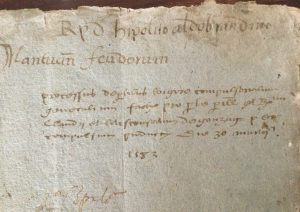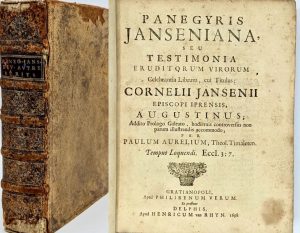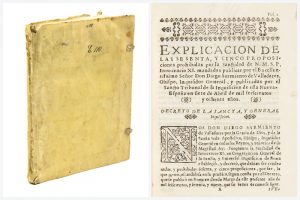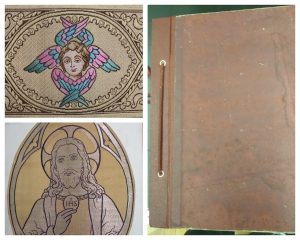Special Collections, including the Rare Books Department, like the rest of the world, is continuing to emerge from the shadow of the COVID Pandemic. We continue to purchase new books and related materials, which we reported on in our November 2020 and November 2021 blog posts, and are pleased to announce further acquisitions during the 2021-2022 fiscal year from reputable dealers in order to further enhance our collections. This was a banner year, with eight purchased Rare Book acquisitions, four of which are featured below. The others are listed in the footnotes and more information is available upon request.



The third accession was a book printed in Mexico, then a province of Spain, by Por Dioego Fernandez de Leon in 1684, titled: Explicacion de las sesenta, y cinco proposiciones prohibidas por la santidad de N.M.S.P. Innocencio XI. mandadas publicar por el Excellentissimo Señor Don Diego Sarmiento de Valladares, obispo inquisidor general: y publicadas por el Santo Tribunal de la Inquisicion de esta Nueva España en siete de abril de mil seiscientos, y ochenta. Author el padre fr. Mathias Rodriguez, predicador, y confessor, de la Santa Provincia de San Diego de religiosos descalços de N.P.S. Francisco de esta Nueva España ; dedicada al Capitan Don Francisco de Alarcon, y Espinosa alcalde ordinario, que fue de la ciudad de la Puebla de los Angeles, su regidor, y thesorero general de la Santa Cruzada. This is a first edition, 7.5 x 6 inches, with an armorial woodcut on the second leaf, bound in contemporary vellum with remnants of the original ties. The text was written by Fransican friar Mathias Rodriguez of San Diego, New Spain, examining a papal bull condemning sixty-five supposed heretical propositions or ‘laxism’ by Jesuits relating to fornication, gluttony, robbery, and usury. This includes the original Latin of the bull, the Spanish text of the heresies, and Rodriquez’s commentary. In order to expand their ministry, many Jesuits adopted a less stringent approach to theology (‘probabilism’), resulting in Pope Innocent XI’s condemnation in 1679 reasserting Conservative ‘rigorism.’[3] Among the condemned propositions in this book are two related to abortion. Obtained in January 2022 from Liber Antiquus.

The fourth acquisition is a salesman’s sample book of sacramental textiles from the French firm of G. Bochard, which operated in St. Etienne from the late nineteenth century until the mid-twentieth century. The company focused primarily on embroidered silks, not only for vestments, but also table cloths, banners, and book braids. Examples in this volume include swatches of numerous priestly vestments, including cincture, maniple, stole, chasuble, cape, dalmatic, surplice, and cotta represented in vivid woven silks as well as embroidered and tapestry fabrics, many with stock notes, and other related marginalia in French. This burgundy board scrapbook, ca. 1935, has a string tied with matching silk braid, approximately 10.5 by 8 inches, containing 16 card stock leaves mounted recto and verso with 92 original silk sample swatches. There are also three black and white mounted photo illustrations of finished patterns.[4] This was purchased in March 2022 from Type Punch Matrix.
In addition, there were four other purchased acquisitions, listed below. These new arrivals are a further enhancement to the diverse Rare Books Department of Special Collections at Catholic University. They are already making an impact via perusal by patrons and instructional purposes for various university classes. If you are a faculty, student, or alumni with interest and expertise in rare books and have acquisition suggests, please contact us. We can not make any promises but will seriously consider any proposals.
[1] Sandra Antunes, R. Dr. Augusto Jose da Cunha 9 Menos-2C,1495-240 Alges, Portugal.
[2] David Rueger, Inlibris LLC, 245 9th Ave, #166, New York, NY 10011.
[3] Paul Dowling, Liber Antiquus, 7306 Brennan Lane, Chevy Chase, MD, 20810.
[4] Type Punch Matrix, 1111 E. West Hwy, Suite 300, Silver Spring, MD, 20910.
[5] Small format Prayer Booklet to the Holy Family, partially titled, ‘Tierna, Y Dulce Memoria…’ printed in Puebla by Manuela de la Ascension Cerezo, 1753, purchased in June 2021 from W. S. Cotter Rare Books, 4615 Cedar Point Drive, Auston, TX, 78723.
[6] Broadside by Adolph Sutro, titled ‘Sutro and the A.P.A.’, printed in San Francisco, 1894, regarding the anti-Catholic American Protective Association, obtained in June 2021 from David Lesser, Fine Antiquarian Books, One Bradley Road, Woodbridge, CT, 06525.
[7] Two catechisms in English and Odjibwe, titled ‘Katolik Anamie…’ 1880, and ‘A Baltimore Short English-Odjibwe Catechism..’ 1896, bought in February 2022 from William Reese Company, 409 Temple Street, New Haven, CT, 06511.
[8] Collection of Sixteen Anti-Catholic Pamphlets from the Rail Splitter Press, ca. 1920-1935, acquired in April 2022 from Walkabout Books, P.O. Box 22, Curtis, WA, 98538.
